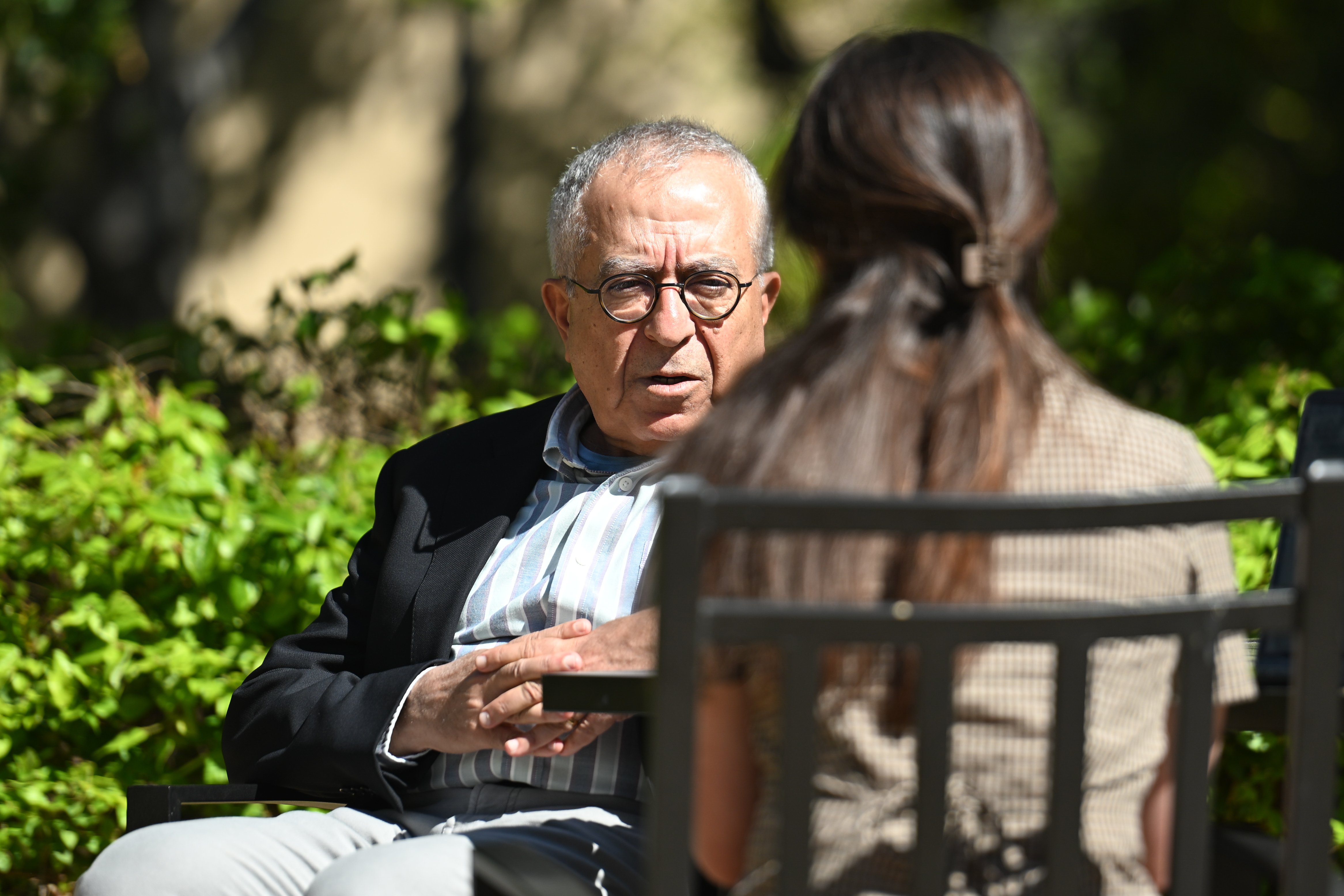Former Prime Minister of the Palestinian Authority Salam Fayyad expressed support for student activists, in conversation with Larry Diamond ’75 M.A. ’78 Ph.D. ’80 on Monday. Fayyad shared his views on the future of the Israel-Gaza war at the event, which was hosted by the Freeman Spogli Institute for International Studies at Encina Hall.
Pro-Palestine protests and encampments
Before the public event, Fayyad told The Daily he considered student activism at Stanford effective, especially the recently established pro-Palestine encampment and the 120-day Sit-In to Stop Genocide in White Plaza.
From his recent visit to encampments at Princeton and brief observation at Stanford, Fayyad said they were “normal” expressions from students impassioned by collective grievances for humanity.
“[The encampments were] in one word orderly. In two words, orderly and peaceful. And in three words, orderly, peaceful and normal,” Fayyad said.
Amid a national wave of activism and administrative crackdown, Fayyad expressed his dismay with how students were punished. Across the country, more than 800 arrests have been made, including over 100 arrests, suspensions and threats of expulsion at Columbia University alone.
“People think it’s fun to do encampment — I don’t think so,” Fayyad said. “People don’t do it because it’s fun, students do it because they feel a sense of duty to participate. And that is something to be respected and honored and not resisted, not to threaten students with being suspended.”
Fayyad called Stanford’s encampment in White Plaza “as orderly as they come.” The encampment run by students calls on Stanford to cut financial ties and partnerships from Israeli-affiliated companies.
“They’re not in anybody’s way. They’re peacefully congregating … if that cannot happen on college campuses where can it happen?” Fayyad said.
At the public event, Fayyad denounced interpretations of protest slogans as antisemitic or calls for violence against Jewish students. He said the students he spoke with criticized this characterization.
“The justness of our cause is grossly undermined if that is how it is characterized. We refuse to be pigeonholed,” Fayyad said.
Fayyad said that it was important to understand the historical role and background of the slogan “from the river to the sea, Palestine will be free.” According to Fayyad, the slogan emerged after the 1948 chartering of Israel as a state dedicated to Jewish self-determination and a Jewish majority. He said that the slogan represents only one narrative, while a contrasting view that the entire land belongs to Israel is also widely supported.
“Younger people have a sense for what they think is right and what they think is just,” Fayyad told The Daily.
Two-state solution
When asked by Diamond for his ideal outcome to the 75 year-long dispute between Israel and Palestine, Fayyad said he supported a two-state solution — as long as “any quest for that outcome … is preceded by formal recognition of [Palestinian] rights as a people.”
Fayyad called for parity and nuanced dialogue between the parties to the conflict.
“Not the oppressor, not the oppressed, not the master, not the slave,” Fayyad said. “We are all members of the human race, we have the same feelings, we have the same anxieties, we have the same source of what we think in our worldly pursuits of life.”
Talks of the future cannot be the top priority if there continues to be an imbalance in rights recognition, according to Fayyad. In his conversation with Diamond, Fayyad stressed for Israel to immediately recognize the rights of Palestinians and for Palestinians to assume agency in their cause for liberation.
“I have often said there’s a lot to cry about, especially these days as Palestinians. But that by itself is not going to give us the freedom that our people deserve, the freedom and the dignity that many of us died and continue to die [for],” Fayyad said. “I don’t believe that our freedom is Israel’s to give. It is our inalienable rights.”
When asked about the asymmetry of Israel’s approach to the two-state solution, Fayyad said there were stark differences in mutual recognition between Palestine and Israel. He identified one such imbalance in the 1993 Oslo Accords, in which the Palestine Liberation Organization (PLO) recognized Israel’s right to exist, while Israel recognized PLO as Palestinian’s rightful representative.
Fayyad called the “right to exist” a “profoundly higher order of recognition” in international relations as compared to simply “recognizing the existence of something.”
After rights recognition, Fayyad said he believed that Palestinian people can engage in productive dialogue by proposing a statehood and advocating for liberation.
Fayyad said he did not have political ambitions tied to the Palestinian Authority. He preferred building consensus rather than imposing his views on others, Fayyad said.
Ongoing Israel-Gaza war
Fayyad said that Israel’s objectives in the ongoing Israel-Gaza war are impossible, or at least at least extremely unlikely, since more than six months into the war, Hamas continues to control Gaza.
Several audience members inquired about Fayyad’s perspective on Hamas’s role in Palestinian territories, according to Associate Director for Research at the Center on Democracy, Development and the Rule of Law (CDDRL) Hesham Sallam.
“Hamas has an ideology, it’s a political movement — and the only way you can compete with an idea is with a better idea,” Fayyad said.
Fayyad said that it is neither realistic nor feasible to entirely exclude Hamas from Palestine, considering that they hold political support among Palestinian civilians.
Fayyad proposed incorporating Hamas into the Palestine Liberation Organization, without formal inclusion in other forms of governance, until elections occur in Palestine. For Fayyad, it is the responsibility of the Palestinian people to effectively manage political pluralism, which in his view, “is entirely possible.”
